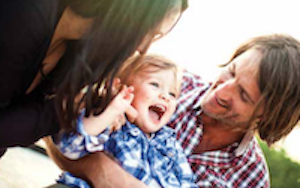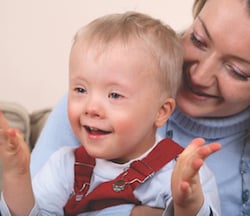A Family Guide to Participating in the Child Outcomes Measurement Process
Introduction
As a parent of a young child who is in an early intervention (EI) or early childhood special education (ECSE) program, you want to be sure these services are helping your child develop and learn. These services are designed to make the most of each child’s potential, as well as to strengthen the family’s ability to help their child. But how can you know if your child’s early intervention or special education program is meeting his or her needs?
One way to learn more about your young child’s progress is through three “child outcomes” that are measured for every child in the United States who participates in an early intervention or early childhood special education program. These outcomes will help you know how well your child is developing and participating in activities at home, at school, or in the community. In addition to helping you measure your child’s individual progress, these outcomes are also used to measure how well your child’s early intervention or early childhood special education program is serving all children who are enrolled.
By participating in the outcome process, you are not only helping your own child but are also helping your district and state know how early childhood programs are performing overall. As the parent, you are a critical part of your child’s development and education, and this guide will help you understand and meaningfully participate in the outcome measurement process for your child’s program.
What Are the Three Child Outcomes?

The following outcomes, developed by the U.S. Department of Education, are used by all early intervention and early childhood special education programs to measure young children’s progress. While Individual Family Service Plan (IFSP) outcomes and Individualized Education Program (IEP) goals are written specifically for your child, these three child outcomes are the same for everyone.
Three Child Outcomes to Measure Progress:
- Gaining positive social emotional skills, including social relationships. This outcome measures how children interact and play with their family, other adults, and other children.
- Learning and using new knowledge and skills. This outcome measures how children learn and use basic language and communication skills such as counting and problem-solving that will prepare them to be successful in kindergarten.
- Using appropriate behaviors to meet their needs. This outcome measures how children gradually become more independent by learning how to move from place to place, feed themselves, and take care of basic needs.
Why is This Information Important to My Child and Our Family?
The three child outcomes focus on what your child can do in his or her everyday routines and activities. By looking at how well your child is doing in each of the three areas, you can determine what he or she needs in order to become more involved in your family’s activities. The information gathered about your child will also help you develop individual outcomes and goals for your child’s Individual Family Service Plan (IFSP) or Individualized Education Plan (IEP). As a parent, you may notice that by learning more about the three child outcomes, you also:
- Gain confidence in your ability to observe your child and share those observations with others.
- Develop an increased understanding of how your child is functioning compared to age expectations.
- Learn to track and celebrate the progress that your child is making.
- Contribute more to IFSP or IEP team discussions about your child’s strengths and accomplishments and the development of appropriate outcomes or goals.
How Can I Be Part of the Outcome Measurement Process?
When first developing your child’s IFSP or IEP, you should ask your child’s early intervention providers or early childhood special education teachers how the three outcomes will be measured for your child and how they relate to your child’s individual plan. If you feel unsure about the process, or want an update on how your child is progressing, these questions will help you start the conversations:
- What resources are available to help me understand what is expected for a child at different ages?
- What specific skills and behaviors do you look at for each outcome?
- What information will you need from me in order to complete the outcomes measurement?
- How can I share my observations about my child’s skills, abilities, routines and activities?
What Information Can I Share About My Child's Progress?

You can be prepared for any conversation about your child’s development by making your own observations and sharing what you see. It may be helpful to review these questions often and take notes about what you see that’s new or is happening in a different way. Even small changes are important in the measurement of the three child outcomes.
Outcome 1: Social Emotional Skills and Relationships
- How does my child relate to family members, close family friends, caregivers, and strangers?
- How does my child relate to other children at child care or in the neighborhood? With people in the community (such as the park or grocery store)?
- How does my child show his or her feelings? How does he or she calm down when upset?
- How does my child show that she or he understands social rules, such as sharing and taking turns?
Outcome 2: Knowledge and Skills
- How does my child copy others’ actions or try to learn new things?
- How does my child try to solve problems?
- How does my child use words?
- Does my child understand concepts such as numbers and shapes?
- Does my child understand and respond to directions from others?
- How does my child communicate his or her thoughts and ideas?
Outcome 3: Meeting Needs
- How does my child get from place to place?
- What does my child do when he or she wants something? What if it is hard to reach?
- What does my child do when he or she needs help?
- What does my child do when he or she is hungry?
- How does my child help with dressing or undressing, using the bathroom, and brushing his or her teeth?
- Can my child feed him or herself?
- What does my child do without my help?
You may want to set up regular times with your child’s early intervention providers or early childhood special education teachers to share this information. This will make sure that your input is being used to measure your child’s progress in the three outcomes.
In addition to sharing your own observations, you may also want to ask your child’s providers and educators what they are seeing. The information you receive can help you understand your child’s development in different settings and situations. This will help you be a full partner in outcomes measurement.
How Will I Know if My Child is Making Progress?
Looking at your child’s progress over time is important for updating your child’s IFSP or IEP and making sure that he or she is receiving the services needed to meet the individualized goals or outcomes. This same information is also needed to measure the three child outcomes accurately at the end of services.
Your IFSP or IEP document should state when and how often information on your child’s progress will be shared. You can also ask providers or teachers at any time you have questions or concerns.
Asking early childhood teachers or providers the following questions will give you information about your child’s progress in the three outcomes:
- How are you measuring my child’s progress? Are you using observations? Assessments?
- What are you seeing that tells you that my child is or is not making enough progress?
- How is my child’s progress on his or her IFSP outcomes or IEP goals related to progress in the three child outcome areas?
- How does my child now compare to other children his or her age? What do most children his or her age do in regard to this outcome area?
- How do you see my child’s disability affecting his or her ability to make more progress in this area?
- What are the next skills needed in order for him or her to make progress?
Conclusion: You Are the Expert!
When parents and professionals work together as a team, children do better. While professionals have expertise in working with children, you are the expert on your own child. You have information about your child that cannot be gathered through any other method other than to hear it directly from you.
By sharing your observations of your child, you will be helping your early intervention service providers or early childhood special education teachers understand your child’s strengths and needs. You will help your IFSP or IEP team understand how your child is progressing on the three child outcomes and what skills need improvement. Through your involvement, you will help your child to be an active and successful participant now and in the future at home, in the community, and at school.
